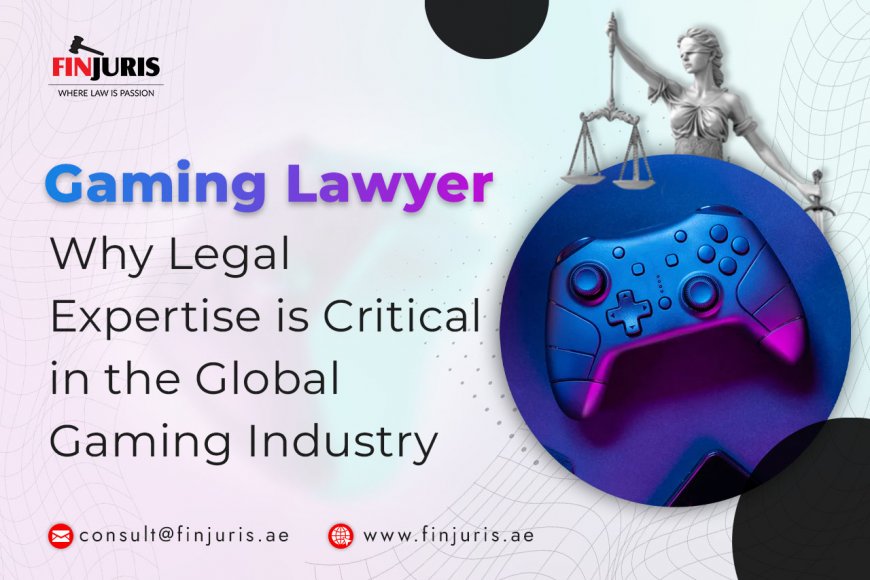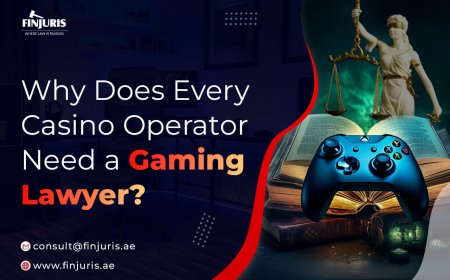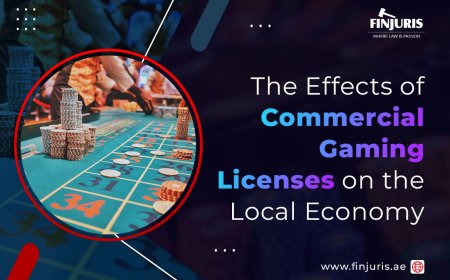Gaming Lawyer: Why Legal Expertise is Critical in the Global Gaming Industry
Navigate the global gaming industry's legal maze. Discover why expert gaming lawyers are crucial for compliance, IP, and business success.

The gaming industry has evolved into a global, multibillion-dollar ecosystem that intersects with entertainment, technology, finance, and law. From mobile game developers to esports teams, from online casinos to blockchain-based games, the industry’s legal complexities are growing. At the heart of this evolving space is a specialized professional: the Gaming Lawyer.
A gaming lawyer is not just a legal advisor—they are a strategic partner who helps gaming businesses stay compliant, secure intellectual property rights, avoid litigation, and expand internationally. As gaming becomes more sophisticated and regulated, having the right legal guidance can mean the difference between success and shutdown.
What Does a Gaming Lawyer Do?
A gaming lawyer provides legal advice and representation tailored to businesses and individuals involved in gaming and interactive entertainment. Their services span a wide array of domains, including:
- Online gambling and internet gaming law
- Video game development contracts
- Intellectual property (IP) protection
- Regulatory licensing and compliance
- Esports contracts and sponsorship agreements
- Terms of service and privacy policies
- Virtual assets and NFTs
- International game distribution and localization
Gaming lawyers operate at the intersection of tech law, entertainment law, intellectual property, and regulatory compliance—making their expertise uniquely suited to the industry’s needs.
Read More: Gaming Lawyer: Understanding the Role and Importance in the Industry
The Increasing Need for Gaming Lawyers
The global gaming sector is no longer a "wild west" of unregulated play. Governments across jurisdictions are tightening regulations, especially around online gaming, loot boxes, gambling elements, and data privacy. Here's why a gaming lawyer is now indispensable:
1. Regulatory Complexity
Whether you're launching a casino app, fantasy sports platform, or real-money skill game, you may need a gaming license—and each jurisdiction has its own rules. For example:
- The UK Gambling Commission requires strict compliance with AML and responsible gaming standards.
- In the U.S., laws vary state by state—what’s legal in New Jersey may be banned in Utah.
- India is developing a new regulatory framework, differentiating between games of skill and chance.
A gaming lawyer ensures your platform operates within legal bounds, helping you avoid fines, bans, or criminal liability.
2. Intellectual Property (IP) Protection
Game developers rely heavily on copyrights, trademarks, and licensing agreements. A lawyer ensures you retain ownership of your creative work and avoid infringing on others.
They also help with licensing third-party content (music, artwork, game engines), publishing agreements, and defending your game from clones or copyright trolls.
3. Monetization & Virtual Economies
Many modern games feature in-game currencies, NFTs, skins, and digital marketplaces. Some of these may qualify as financial instruments or securities depending on their use.
A gaming lawyer can:
- Determine whether your digital assets need regulatory approval
- Draft legal disclaimers for in-game purchases
- Protect against fraud, theft, and chargebacks
This is especially crucial for blockchain-based games and play-to-earn models.
4. Esports Contracts & Sponsorships
Esports is now a billion-dollar industry, and it comes with its own legal framework. Lawyers draft and review:
- Player contracts
- Tournament rules
- Team ownership agreements
- Sponsorship and brand deals
Without legal protection, players and teams risk exploitation, payment disputes, or contract terminations.
Read More: How to Choose the Right Gaming License Jurisdiction for Your Business
When Do You Need a Gaming Lawyer?
Not every situation requires legal representation, but here are key moments when hiring a gaming lawyer is strongly recommended:
- You’re launching an online game with monetization
- You want to protect your game’s IP globally
- You're raising funding from investors or launching an ICO
- Your game includes loot boxes or gambling mechanics
- You need to register or renew a gaming license
- You’re expanding into new international markets
- You're entering into esports sponsorships or player contracts
- Your game uses user-generated content (UGC) or third-party IP
Early legal advice is always more cost-effective than fixing mistakes after they happen.
Read More: Gaming Lawyer: Understanding the Role and Importance in the Industry
Legal Issues Gaming Lawyers Help Resolve
Here are some of the most common legal issues gaming lawyers handle:
Licensing & Regulation
- Gaming and gambling license applications
- Jurisdictional compliance (e.g., Curacao, Malta, Isle of Man)
- AML and KYC frameworks for real-money gaming
- Age verification and responsible gaming policies
Contracts & Agreements
- Developer and publisher agreements
- Terms of service and EULAs
- Software licensing deals
- Content creator and influencer agreements
IP & Copyright
- Game IP protection (characters, music, storyline)
- Trademarks for game titles or studios
- Copyright enforcement against clones or unauthorized use
Data Protection & Privacy
- GDPR, CCPA, and international data law compliance
- Children’s privacy laws (e.g., COPPA in the U.S.)
- Privacy policies and cookie notices
Dispute Resolution
- Lawsuits over stolen IP or code
- Payment or revenue-share disputes
- Player or community lawsuits over banned accounts or refunds
Global Perspective: Gaming Law Around the World
Gaming laws vary dramatically across regions. Here’s a quick snapshot of how a gaming lawyer’s role changes depending on jurisdiction:
United States
Gaming is regulated at the state level. Lawyers help navigate licensing, fantasy sports legality, gambling bans, and platform compliance with federal laws like the Wire Act.
European Union
The EU imposes strict regulations on gambling, advertising, and data protection. Lawyers often help with MiCA compliance, GDPR readiness, and payment gateway licensing.
United Kingdom
The UK Gambling Commission is one of the strictest regulators. Legal guidance is essential for license applications, audit readiness, and consumer protection policies.
Singapore & Hong Kong
These are emerging gaming hubs with strong IP enforcement. Lawyers help with company structuring, token offerings, and regulatory approvals.
UAE & Dubai
Dubai’s Virtual Assets Regulatory Authority (VARA) is now licensing metaverse and Web3 projects, including gaming. Lawyers are critical for crypto-integrated gaming ventures here.
India
With multiple High Court rulings and pending legislation, legal advice is essential for distinguishing between games of skill (legal) and chance (often restricted).
How to Choose the Right Gaming Lawyer
When choosing a lawyer for your gaming venture, consider the following:
- Experience in your niche: Not all lawyers understand both fantasy sports and blockchain gaming.
- Global reach: If you’re operating internationally, pick someone familiar with cross-border compliance.
- Tech fluency: They should understand terms like smart contracts, tokens, and APIs—not just legal jargon.
- Contract and IP expertise: Protecting your code, characters, and community requires skilled drafting.
- Reputation and transparency: Ask for testimonials and clear pricing models.
Common Misconceptions about Online Gaming Licenses
Some law firms even offer crypto, esports, and gaming law bundles, tailored to startups and SMEs.
In the fast-moving world of digital gaming, legal issues can arise just as quickly as new features or monetization models. A gaming lawyer provides the foundation for building a compliant, secure, and successful business in this dynamic environment.
Whether you’re a solo developer or a multi-national platform operator, early and ongoing legal support can protect your innovation, prevent costly disputes, and support your long-term vision. As the lines between games, finance, and entertainment continue to blur, having a knowledgeable legal partner isn’t just smart—it’s essential.
What's Your Reaction?




















